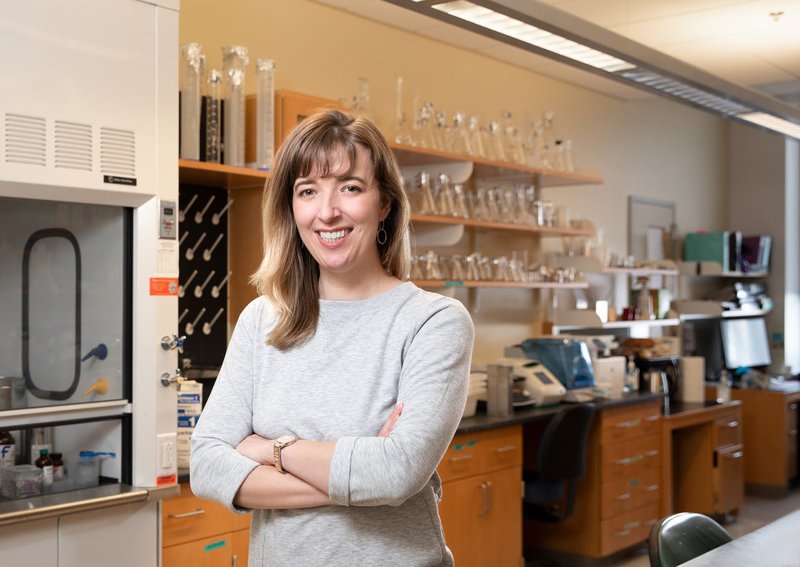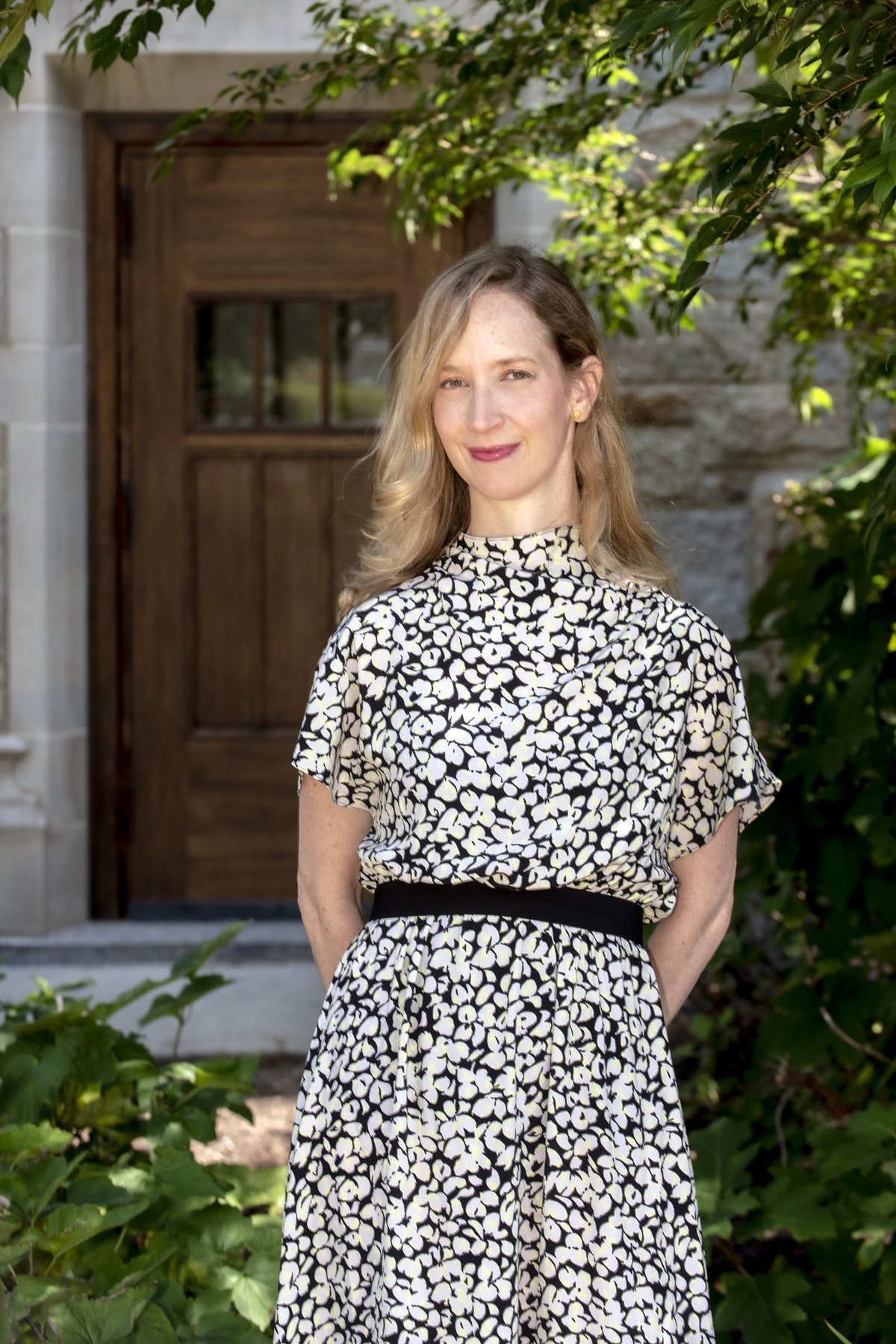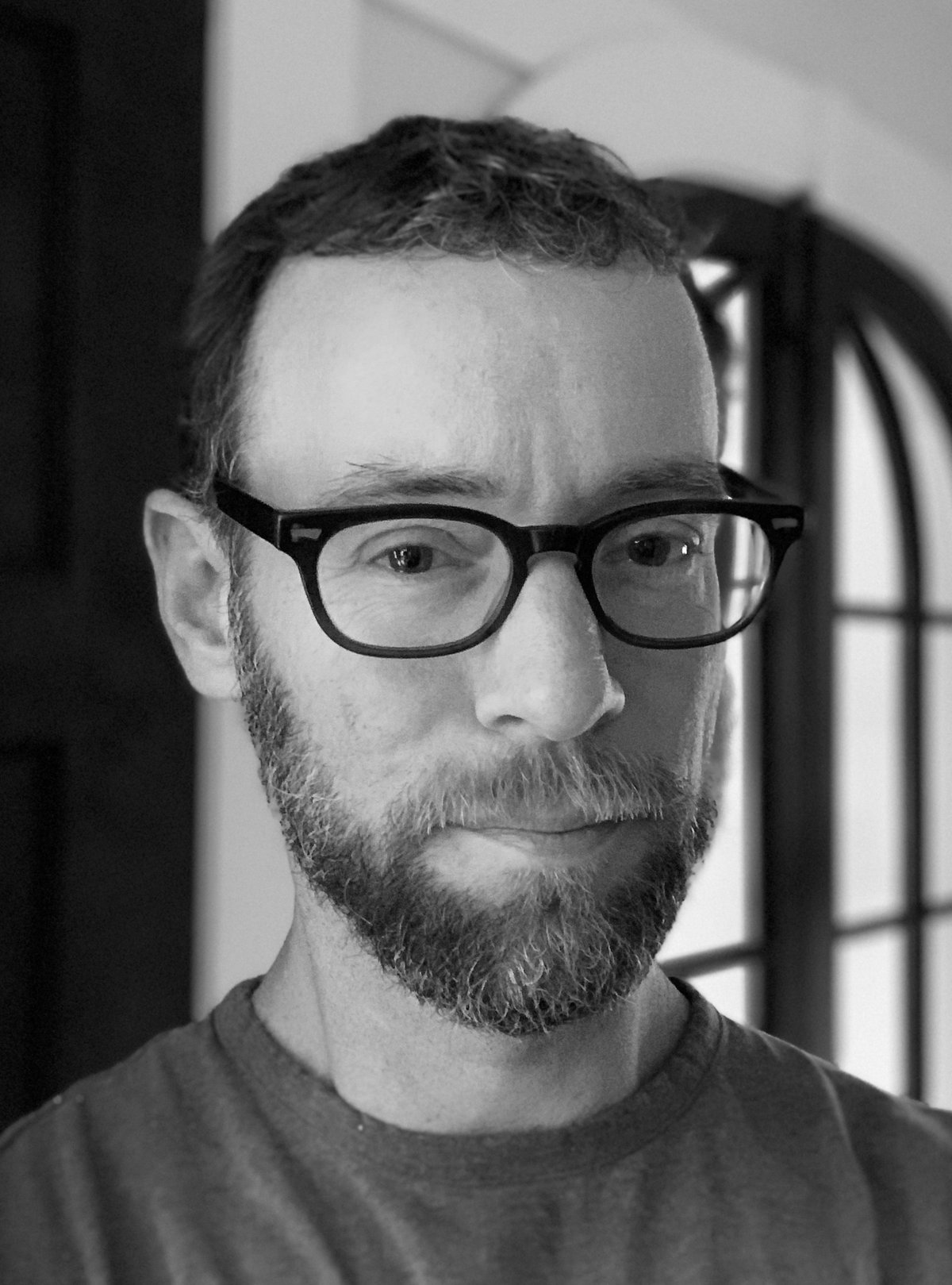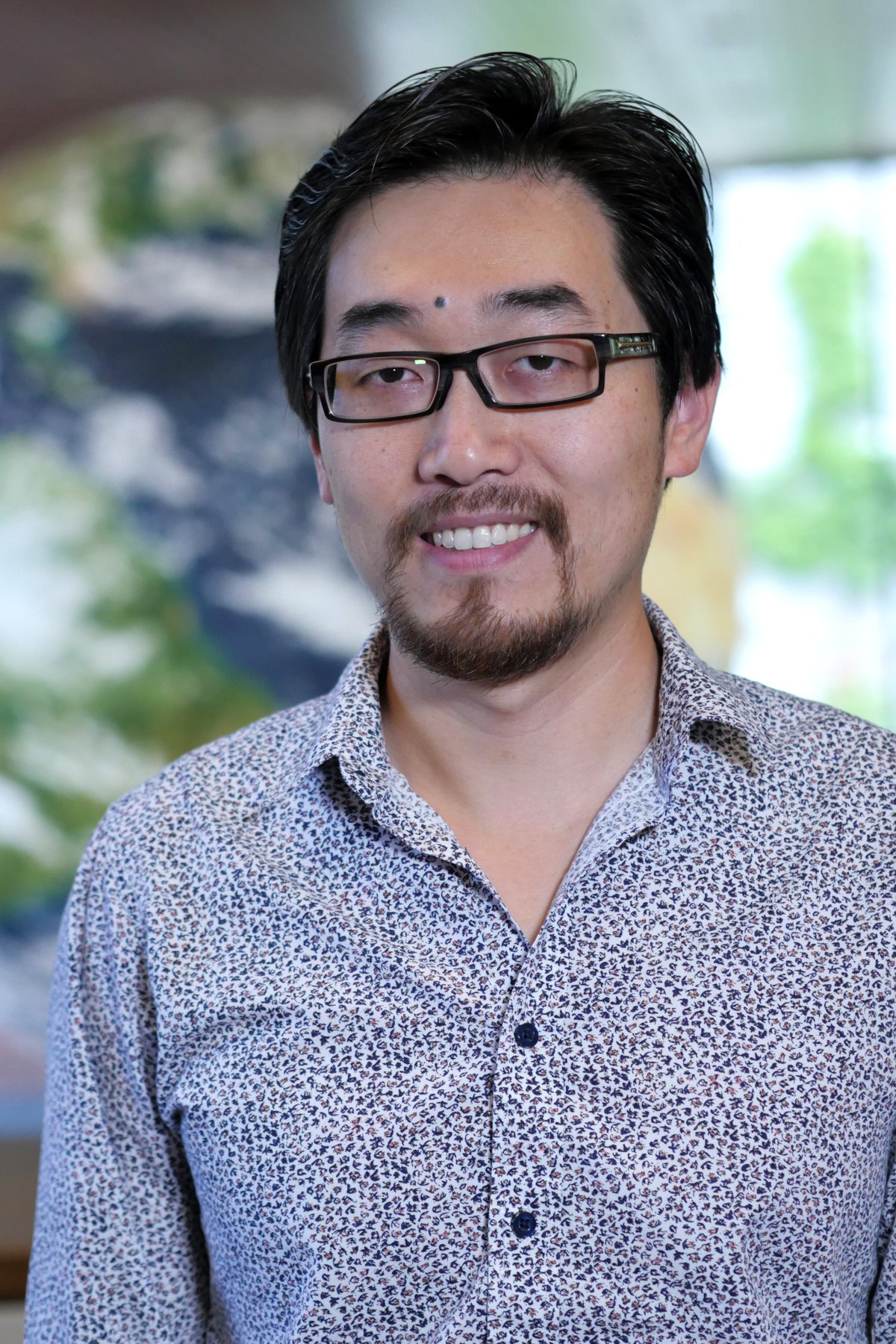Best-in-Class Faculty
Putting the big questions (and smallest cells) under the microscope.

Meet four faculty members, supported in part by generous donors, whose pursuit of educational and research excellence provides students with innovative learning opportunities and the chance to contribute to addressing chronic problems and societal questions.
I. Renée Crown Honors Professorships
II. William P. Tolley Distinguished Teaching Professor in the Humanities
III. Thonis Family Professor of Earth and Environmental Sciences
Examining the ‘Hows’ and ‘Whys’ of Life
Over the past two decades, the Renée Crown University Honors Program has helped high-achieving students become leaders who are socially aware, globally informed and finding solutions to real-life problems. The family of Trustee Emerita Renée Schine Crown ’50, H’84 has now renewed its commitment to the program with a new gift establishing two Crown Honors Professorships in A&S. Each will serve a term of three years.
Heidi Hehnly, associate professor of biology at Syracuse University since 2018, is the inaugural Renée Crown Professor in the Sciences and Mathematics. She specializes in the mechanics of cellular division and how and when cells in the body choose to divide. Before coming to Syracuse, Hehnly was an assistant professor at SUNY Upstate Medical University.
With nearly $3.5 million in federally funded research grants from the National Institutes of Health and the Department of Defense, among others, Hehnly and members of her team are addressing urgent health needs relating to developmental disorders, genetic mutations and cancer-causing genes.
In addition to laboratory research, Hehnly has helped foster interdisciplinary learning opportunities for students at Syracuse, such as the University’s first Bio-Art class. (More about Bio-Art)

Heidi Hehnly, inaugural Renée Crown Professor in the Sciences and Mathematics.
Hehnly’s Honors course, titled Light Microscopy and Illustration in Cell and Developmental Biology, will focus on fundamental principles in cell and developmental biology, such as mechanisms of embryonic development, cell division and tissue formation and maintenance, and how they are displayed through imagery. Students will participate in Bio-Art programming, tour microscopy facilities at Syracuse and participate in classes on biological illustration. In the second and third year of her professorship, Hehnly hopes to offer a Bio-Art studio/ laboratory class for Honors students with an associated art show co-taught with Boryana Rossa, associate professor of art video in the College of Visual and Performing Arts.
“This professorship provides the opportunity to create courses that are welcoming to a diverse range of students,” says Hehnly. “Whether they have an interest in science, art or both, students will get plenty of experience in these courses with microscopy and other advanced biological techniques.”
Karin Nisenbaum, assistant professor of philosophy, is the inaugural Renée Crown Professor in the Humanities. She has been a faculty member in the Department of Philosophy since 2021. Before joining Syracuse University, Nisenbaum was an assistant professor of philosophy at Colgate University and Boston College.

Karin Nisenbaum, inaugural Renée Crown Professor in the Humanities.
Her research focuses on topics at the intersection of metaphysics and ethics in Kant, German Idealism and modern Jewish thought. Most recently, she is author of "For the Love of Metaphysics: Nihilism and the Conflict of Reason from Kant to Rosenzweig" (Oxford University Press, 2021).
Nisenbaum’s courses approach questions such as: What is the ultimate aim of moral action? If we affirm God’s existence, what sort of arguments can we provide in support of the view that God exists? What is the value of hope, and how can we sustain it, especially when we are confronted with evil?
During the 2022–23 academic year, Nisenbaum is teaching two Honors classes: Introduction to Ethics, and Philosophy and Literature.
In Introduction to Ethics, students will be presented with situations in life that require difficult decisions and will discuss how to answer questions such as: What is the morally right or wrong thing to do? What would a virtuous person do? What are my duties to others? By being introduced to different ethical theories, thinkers and concepts, students will challenge, defend or gain clarity on their own ethical convictions, as well as those of others.
Philosophy and Literature will invite students to consider the philosophical significance of foundational literary works such as Plato’s Republic. In that dialogue, Nisenbaum explains, Plato famously banished poets from the ideal city and thereby established the traditional separation of literature from philosophy, fiction from truth, and logical argument from persuasion. By examining the literary style of selected philosophical texts, Nisenbaum will ask students to think about how different modes of writing can address traditional questions of philosophy and illuminate significant features of human existence.
For Nisenbaum, exploring the human experience with students is one of the most rewarding aspects of being a professional philosopher.
“Aristotle said that philosophy begins in wonder. But at times it can be difficult to maintain that sense of wonder when I am immersed in the weeds of my own research,” she explains. “My undergraduate students help me focus on the big questions, such as: What can I know? What should I do? What may I hope? What is man? These are the four most important philosophical questions, according to Kant.”
Translating Science into Action
Scientists can present hard data about the climate crisis and other ecological challenges. But to understand climate change’s impact on people and society, it is the humanities that translate the science into meaning and action.

Mike Goode, William P. Tolley Distinguished Teaching Professor in the Humanities.
That is the vision driving Professor of English Mike Goode, new William P. Tolley Distinguished Teaching Professor in the Humanities. He recently was awarded the two-year rotating appointment, established in 1995 to honor Chancellor Emeritus William P. Tolley. It is designed to enhance students’ learning experiences and is underwritten by private donors and the National Endowment for the Humanities.
So, what does it mean to teach climate change in a humanities course or to make humanities instruction more ecologically minded?
“Climate change and other kinds of environmental issues impact certain groups of people, such as those living in disadvantaged conditions, disproportionately. Humanists think about climate not just as a scientific issue, but also as a human issue having social justice components. That’s something humanists can bring into the conversation,” Goode says.
He was inspired in part by his research on the history of landscape gardening in Britain, both as a practice and as something that influenced artists and philosophers contemplating reality, for his book, "Romantic Capabilities: Blake, Scott, Austen, and the New Messages of Old Media."
Goode will also invite collaboration from faculty and staff with diverse perspectives, such as those working in sustainability efforts or teaching law, Native American/ Indigenous studies, geography, biology and film and media arts. This could include things like a debate between philosophy and environmental law professors about granting nonhuman entities like trees or rocks rights. “I believe the College of Arts and Sciences has an opportunity to become a leader in environmental humanities education,” Goode says.
A longer version of this announcement by Diane Stirling was published June 28, 2022, on news.syr.edu.
Learning from Mass Extinctions
Since joining the Department of Earth and Environmental Sciences in 2011, Zunli Lu has built a research program focusing on how life and the planet evolved together. His research seeks to improve our understanding of how catastrophic environmental changes drove mass extinctions in the past, so that people today can try to anticipate the potential consequences of current climate change.

Zunli Lu, Thonis Family Professor of Earth and Environmental Studies.
Through the generosity of Syracuse University Trustee Michael Thonis ’72 and his wife, Susan (Tufts) ’80, Zunli Lu was recently named Thonis Family Professor of Earth and Environmental Sciences. Lu is now the department’s third Thonis Family Professor, joining Suzanne L. Baldwin (2014) and Tripti Bhattacharya (2018).
Michael Thonis is co-founder of and senior advisor at Charlesbank Capital Partners in Boston. Although his career has been in the financial world, he earned a bachelor’s degree in geology at Syracuse, a master’s degree in geology at the Massachusetts Institute of Technology and an MBA at Harvard University.
The Thonis professorship will support Lu's research, where he investigates how animals responded to environmental change millions of years ago. He collaborates with geochemists, paleontologists, Earth system modeling experts and others to determine what factors led to past extinctions, such as the Late Ordovician mass extinction (LOME) of 445 million years ago, which killed around 85% of marine species. In a major paper, Lu and co-authors inferred that the LOME was likely caused by a combination of climate cooling and other factors.
Lu has served as an investigator on nine grants from the National Science Foundation and has published in many prestigious journals, such as Science, Nature and Nature Geoscience. A sought-after speaker around the globe, he has also been the recipient of the Excellence in Graduate Education Award at Syracuse University. Lu was a post-doctoral research associate at Oxford University before joining the Syracuse faculty.


